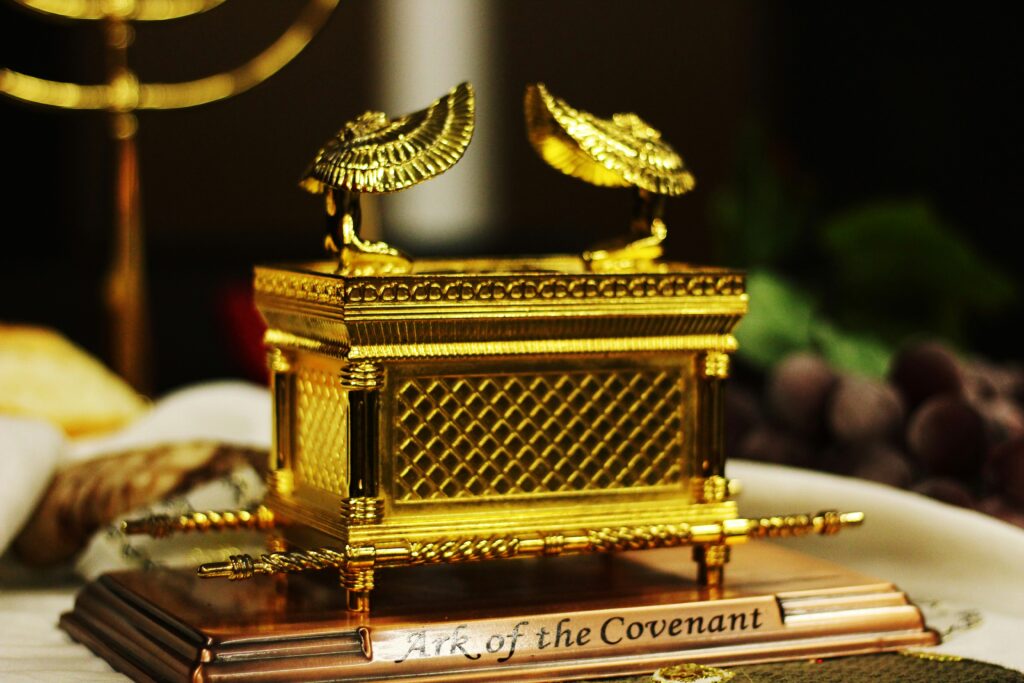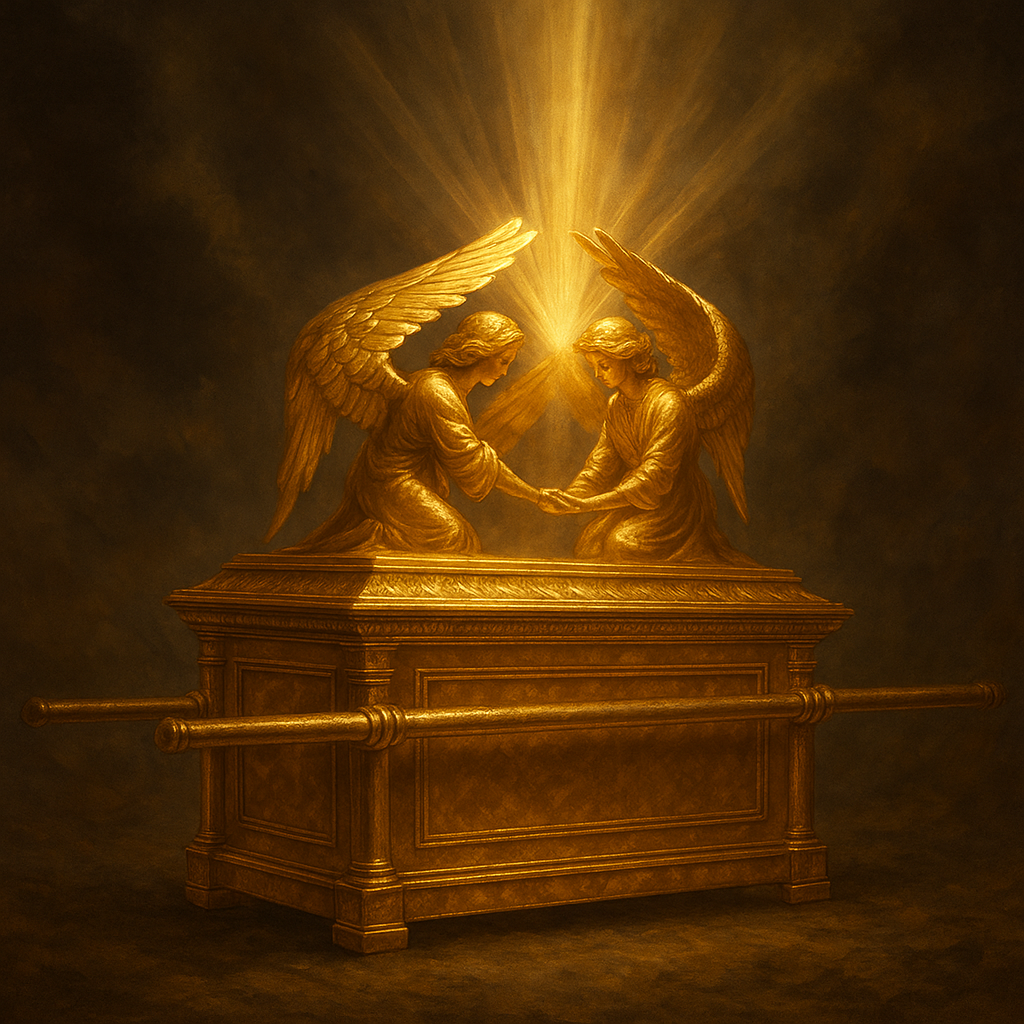
Meaning, History & Biblical Significance
The Ark of the Covenant is one of the most significant objects described in the Old Testament of the Bible.
It was a sacred chest built according to detailed instructions given to Moses. The Ark represented God’s presence among the people of Israel and played an important role in Israel’s worship and history.
This article explains what the Ark was, how it was constructed, what it symbolized, and why it remains important in biblical study today.
The Symbol of God’s Holy Presence
The Ark of the Covenant was one of the most sacred objects in all of Israel’s history. It wasn’t just a box made of wood and gold; it was the visible representation of God’s presence among His people. Wherever the Ark went, the power and favor of God followed.
Let’s explore what the Ark was, why it was so important, and what lessons it teaches us today about God’s holiness, power, and presence in our lives.
What Was the Ark of the Covenant?
The Ark of the Covenant was a sacred chest built according to God’s specific instructions given to Moses on Mount Sinai (Exodus 25:10–22). It was made of acacia wood and overlaid with pure gold inside and out. On top of it sat the Mercy Seat, a solid gold cover with two cherubim (angels) facing each other, symbolizing the throne of God.
What Was Inside the Ark?
Inside the Ark were three holy items:
- The Ten Commandments – God’s law, representing His covenant and moral standard.
- Aaron’s Rod that Budded – a symbol of divine authority and God’s chosen leadership.
- A Golden Pot of Manna – a reminder of God’s daily provision and faithfulness in the wilderness.
The Ark was placed in the Most Holy Place (Holy of Holies) within the Tabernacle and later in Solomon’s Temple. It represented God’s dwelling among His people, where His presence would meet with the high priest once a year on the Day of Atonement.
Why Was the Ark So Important?
The Ark of the Covenant symbolized the throne of God on earth. It reminded Israel that God was with them — guiding, protecting, and fighting for them.
When the Ark went before them, victory followed:
- The Jordan River parted when the priests carrying the Ark stepped in (Joshua 3:14–17).
- The walls of Jericho fell when the Ark was carried around the city in obedience to God’s command (Joshua 6:6–20).
- The Ark’s presence meant divine favor, direction, and protection.
But the Ark was not to be treated casually. It wasn’t a charm or a lucky object — it represented the holy, living presence of God Himself.
The Purpose of the Ark
The Ark served several important purposes in Israel’s history:
1. Symbol of God’s Presence
The Ark was placed in the Most Holy Place within the Tabernacle and later the Temple. It symbolized that God dwelt among His people.
2. Center of Worship
The Ark was central to Israel’s sacrificial system and priestly ministry.
3. Reminder of the Covenant
The word “covenant” refers to a binding agreement. The Ark reminded Israel of their covenant relationship with God, including obedience to His commands.
Why God Was Strict About Holiness Around the Ark
God is holy, and everything connected to Him must be treated with reverence. The Ark was so sacred that only the Levites were allowed to carry it, and even they had to do it using poles, never touching it directly (Numbers 4:15).
When Uzzah touched the Ark to steady it as it was being transported on a cart, he was struck dead instantly (2 Samuel 6:6–7). To modern minds, this may seem harsh — but it was a reminder that God’s holiness is not to be taken lightly. Uzzah’s action, though well-intentioned, disregarded God’s clear instructions.
God’s strictness wasn’t about anger — it was about protecting the sanctity of His presence. Holiness cannot be mixed with human carelessness.
When we embrace Christ and receive the free gift of forgiveness and eternal life, we become “believers” and we are then called to be holy because our Father in heaven is holy. Holiness simply means “set apart” or “called out from”. We as Christians, although live in this fallen world, are called to come out of the world (or worldliness) and into the Kingdom of God. When we live lives different to what this world calls normal, we are “holy” or set apart. When we love our enemies, pray for our enemies, give generously, resist temptations from “pleasurable sinful” activities, and refrain from sexual immoralities, we are living lives opposite to this world. We are then living holy lives. We cannot call ourselves Christians, but live lives without any noticeable change from the world around us. We are ambassadors for Christ.
The Blessing in Obed-Edom’s House
After Uzzah’s death, King David was afraid to bring the Ark into Jerusalem, so it stayed temporarily in the home of a man named Obed-Edom (2 Samuel 6:10–11).
For three months, the Ark remained there, and “the Lord blessed Obed-Edom and all his household.”
Where the presence of God dwells, blessings overflow — not because of superstition, but because His presence transforms the atmosphere of a home.

Imagine Obed-Edom’s family those months — their relationships, work, and health all flourishing because God Himself was with them. Today, we don’t have a golden Ark in our homes, but through the Holy Spirit, we can host God’s presence the same way — through prayer, worship, obedience, and purity of heart.
The Meaning Behind the Contents of the Ark
Each item inside the Ark carried deep spiritual significance that still speaks to us today.
a. The Ten Commandments – God’s Word and Covenant
The stone tablets represented God’s covenant with His people — His standard of holiness and righteousness.
They remind us that obedience to God’s Word is essential to enjoying His presence. God’s blessings follow those who walk in His ways.
b. Aaron’s Rod That Budded – God’s Authority
This rod, once lifeless, miraculously blossomed with buds, blossoms, and almonds overnight (Numbers 17:8).
It symbolized God’s chosen leadership and His power to bring life where there was none.
It teaches us that God appoints authority and that His power works through obedience and divine order.
c. The Golden Pot of Manna – God’s Provision
This manna was a reminder of how God fed His people daily in the wilderness. It represents His faithfulness to sustain us spiritually and physically.
It reminds us to trust in His provision every day — “Give us this day our daily bread.”
Together, these three items remind us of God’s Law, Authority, and Provision — all centered in His holy presence.
For readers who want to explore the Old Testament in more depth, a structured Bible Study guide can be helpful.
What Happens When God’s Presence Is Absent
When Israel lost the Ark to the Philistines, Ichabod was declared — meaning “the glory has departed” (1 Samuel 4:21). Without God’s presence, Israel lost direction, peace, and victory.
The same happens today — when God’s Word, authority, and presence are absent from our homes or churches, confusion takes over. Arguments replace prayer. Disunity replaces worship. Fear replaces faith.
But when we make room for Him, the atmosphere shifts. His presence brings harmony, joy, and spiritual life.
How to Welcome God’s Presence Today
We no longer need to build a golden Ark — because through Jesus Christ, we have direct access to God’s presence (Hebrews 10:19–22). But the principles remain the same.
To host His presence today:
- Keep His Word central in your life and home.
- Walk in obedience and reverence to Him.
- Maintain purity in what you watch, speak, and do.
- Make room for worship and prayer daily.
- Guard unity in your family; God dwells where there is peace.
When God’s presence is honored, blessings naturally follow — just as they did in Obed Edom’s home.
The Ark of the Covenant wasn’t just an ancient artifact — it was a living symbol of God’s holy presence, power, and faithfulness. It reminds us that God’s presence is both holy and powerful — and that blessing flows wherever He is welcomed and honored. When we live holy lives and maintain an environment at home that welcomes God’s presence, then hearing God’s voice gently guiding and directing us, and faithfully trusting in Him in all situations becomes the norm and not just a spiritual activity or a one off moment at church.
So, let your heart and your home become a dwelling place for Him. When you make room for God’s presence, His peace, joy, and favor will rest upon everything you have — just as it did for Obed-Edom.
Common Questions About the Ark of the Covenant
Was the Ark magical?
No. The Ark was not described as having magical power. Its significance came from what it represented — God’s covenant and presence.
Can the Ark still be found today?
There is no verified historical evidence of its current location.
Why is the Ark important in biblical study?
It helps readers understand the covenant relationship between God and Israel and the structure of Old Testament worship.
Why Understanding the Ark Matters Today
Studying the Ark of the Covenant helps readers better understand:
- The seriousness of covenant relationships
- The holiness emphasized in Old Testament worship
- The development of biblical theology
- The continuity between Old and New Testament themes
Historical understanding deepens appreciation for Scripture as a whole.
If you are new to studying biblical history, consider beginning with a Bible Study Plan to explore these themes step by step.
Final Thoughts
The Ark of the Covenant was a central symbol of God’s covenant with Israel. While its physical location remains unknown, its historical and theological significance remains important for biblical study.
By examining its construction, purpose, and role in Scripture, you gain insight into the structure and meaning of Old Testament worship and covenant theology.
For additional reflections and teachings on biblical topics, you may also explore our teaching and discipleship section.
